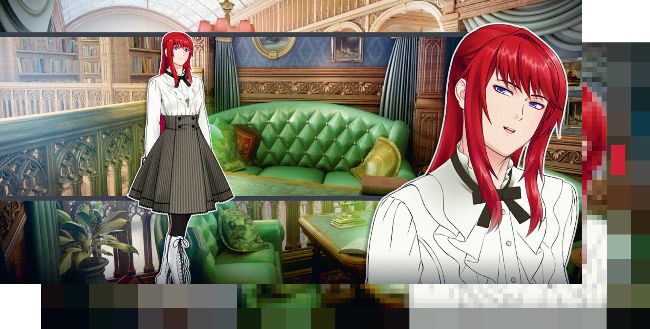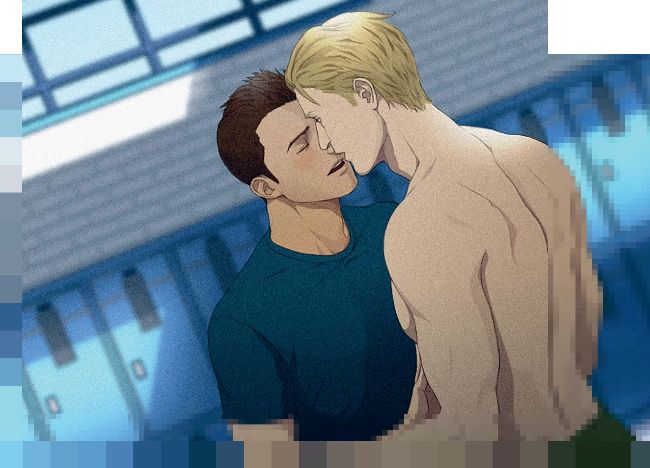Ready Player One
Breaking new ground in LGBT+ representation in gaming culture both on screen and behind the scenes, Chris Rooke leads us through the brave new world of queer dating sims.
Craig and I found ourselves playing catch on the baseball field one evening. We had been college roommates and had reunited when I moved with my daughter, Amanda, to the same town that Craig lived in. His passion for sports had carried through to adulthood: he trained the school baseball team that his twin daughters, Briar and Hazel, played in, while carrying his one year-old, River, in a papoose.
The two of us (and River, of course) had managed to get some time alone during the victory party for another of the team’s successful matches. Notoriously clumsy as I am, one of Craig’s throws hit me in the forehead. He rushed over and, in his words, “did the dad thing” as he examined my head. “Don’t tell me you’ll have to kiss it to make it better,” I teased. “You would be so lucky,” he responded with a smile on his face. I called his bluff : “I mean, I feel I deserve it,” and felt the blood rush to my face as he leaned down and kissed me on the forehead.
It’s important to note at this point that neither Craig, nor this entire scenario, is real. Craig is one of seven dateable dads in Dream Daddy - a queer dating simulator videogame. Dating sims are a sub-genre of visual novels: games in which the story is told largely through text, usually with stylised illustrations of the characters and scenarios. Players take control of an avatar character and choose how the story progresses by selecting options at narrative forks throughout the game. If you ever read a Choose Your Own Adventure book as a child, they’re essentially an interactive version of those. There are no controls to remember, nor complicated gameplay mechanics to learn: just a button press or mouse click to progress through the story.
The genre was largely popularised in Japan, where many of the games are targeted towards heterosexual male players and feature female companions who learn about the player through their choices and interactions.

Closer to home, dating sims have stuck to their more traditional narrative roots. Rather than evolving with technological developments, European and American dating sims have seen the range and types of stories being told through them expand. As the more technical elements of big budget games - such as 3D modelling or artificial intelligence- aren’t required in creating a dating sim, creators with lower budgets, less technical knowledge, or smaller teams are able to create and release their own stories. The rise in crowdfunding platforms as a means of covering development costs and getting some early marketing has also allowed creators greater access to the resources they need to get started. The games are reliant on nothing more than making sure that the dialogue sparkles, and the best games in the genre are charming, hilarious, and sexy — sometimes within the same sentence.
This breadth of access has led to a whole range of different types of dating sim being created, and one of the most notable has been the queer dating sim. The existence of these games in themselves is remarkable: larger studios and publishers rarely feature queerness as anything more than incidental to a character, and, at worst, are used to fuel stereotypes and narrative tropes such as ‘kill your gays’. Queer dating sims place queerness and sexuality at their heart and aren’t afraid to probe them. As they tend to come from queer individuals or inclusive teams, their representation of queer dating and relationships also tends to be more authentic and relatable. Take Coming Out On Top (CooT) in which you play as college student Mark, who comes out as gay to his housemates in the first scene. From there, you’re thrust into the bright world of gay life: your first trip to a gay bar; getting to grips with dating apps; and discovering just how much fun certain sex toys are. Along the way you have the opportunity to date any of up to eight men, including your housemate, your professor, and the guy in the upstairs apartment. While that’s all very good fun, where it truly shines is in its portrayal of queer male sex. Not only are there gorgeous panels of artwork earned when you entice one of the men, but the variety of sexual preferences and activities portrayed reflect a more positive, genuine, and unfiltered approach to sex than most others.
Depictions of sex across the genre vary, and CooT leans towards the more explicit end of the spectrum with its exploration of sex through both art and narrative. Ladykiller In A Bind falls in a similar place, as a visual novel that features lesbian domination and submissive fantasies while also trying to address some interesting concepts around consent. It’s not entirely successful — a key premise of the game is that you are a woman pretending to be your twin brother, thus tricking the other characters into sex without full knowledge of what’s going on — but it is still a rare game about relationships and sex between queer women, created by a queer woman. Positive depictions of healthy, and even kinky, sex are rare in games, and even more so for women and minority groups who often find themselves fetishised as in other media. Games like CooT and Ladykiller are working quietly to show that sex, characterisation, and narrative can be combined into a compelling and entertaining gaming experience.
Sex isn’t necessarily the core focus of all dating sims though. Who We Are Now features sex as the result of a successful connection between two people, but is much more focused on exploring the solidarity and community that queer people find in each other. Set a decade after an apocalyptic event, you play as Wes, who has just returned from the wastelands to a small community aptly called Home. He’s asked by the matriarch of the settlement to help other men come to terms with the trauma they experienced during the apocalypse. It plays as a short but sweet story of finding companionship through struggle, and could be read as an allegory for the coming out process.

Queer dating sims also tend to be more inclusive of those who aren’t young, cis, white, able-bodied men. Jesse, one of the potential love interests in Who We Are Now, is an amputee but there is never any question of his ability or desire for love or sex. In fact by placing him as one of the dateable characters the game is explicitly marking that out for the player, and placing him in a position where he is desirable.
Equally, the breadth of queer lifestyles displayed can be nothing short of revolutionary for pop culture. Dream Daddy exploded into public consciousness in 2017 and while the title is a play on daddy culture, the characters featured are all fathers. Seeing queer men who are comfortable in their ageing, raising families, and simultaneously embracing their sexuality is delightful, and all too rare.
Dream Daddy also adopted player character customisation in a way that reflects the diversity of the queer community. One of the first choices you make is whether your character wears a binder or not. It doesn’t necessarily remain visible throughout the game, or change the story in any way, but is an explicit yet subtle way of allowing trans players to bring that element of their identity into the game.
Long Story goes one step further by eschewing gender selection altogether. Instead, the player is presented with two portraits of androgynous faces, and asked which represents them best. Throughout the game both men and women are available to date, giving the player complete autonomy over how they feel their character identifies and who they are attracted to.
When so few mainstream titles are willing to embrace and explore queerness and sexuality, queer dating sim creators have carved out a space in games where that can be done. The stories that they have told give space to a multitude of identities and orientations, all while being light-hearted and charming. Not only are they great in their own right, but their impact on mainstream gaming is also beginning to be felt: titles like Nintendo’s Fire Emblem series increasingly permit same-sex relationships to be developed and portrayed, with similar (although more family-friendly) dialogue and dynamics being adopted.
The queer gaming community is spearheading its own representation across the industry, by getting down and dirty and embracing, rather than eschewing, our sexuality.